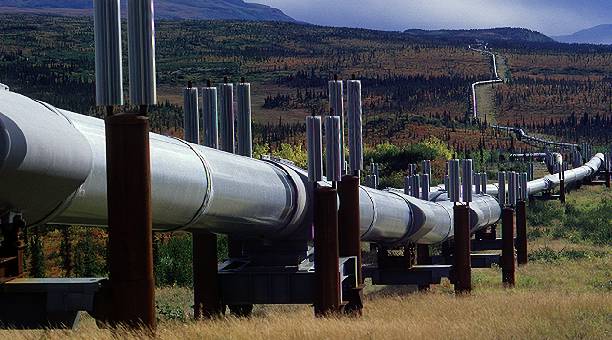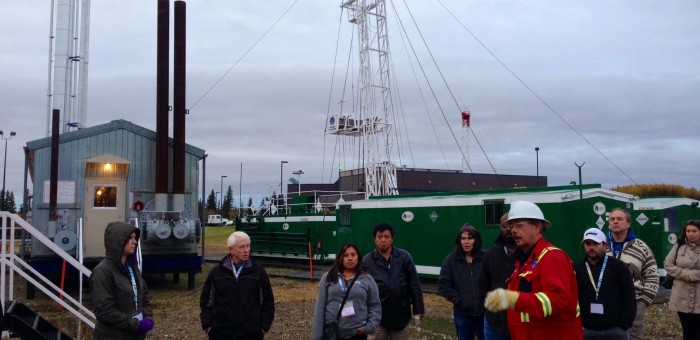Issues & Community Blog - Andrew Weaver: A Climate for Hope - Page 190
Federal decision on Northern Gateway an affront to democracy in BC
On June 17th the Federal Government approved Enbridge’s controversial Northern Gateway Pipeline. The pipeline will see 525,000 barrels of the heavy oil transported from the Alberta tar sands to the BC coast each day, for transport by tanker to foreign refineries.
With its decision, the Federal Government is bulldozing this pipeline through the backyards of British Columbians. Time and time again, First Nations along the pipeline route have made it clear that they will not accept the Northern Gateway pipeline on their traditional territory. The District of Kitimat rejected the project in a recent referendum. And poll after poll has shown an overwhelming majority of British Columbians do not believe the project should move forward.
The Federal Government’s failure to respect the will of British Columbians is particularly ironic. In 1980 when Trudeau introduced the National Energy Program, Albertans were outraged. They argued that it was utterly inappropriate for the federal government to interfere with their energy policy as it was deemed to be within provincial jurisdiction. Have we not learned anything from history?
First Nations along the pipeline route are among those who would be most impacted by its construction. Yet they have been largely ignored throughout much of this process. In fact, a Stephen Harper appointed special envoy on aboriginal and energy issues recently issued a report that showed the federal government’s approach to engagement with First Nations was inadequate.
In an address earlier this month to a conference for treaty negotiators, industry and government, the appointee Mr. Doug Eyford stated:
“I was struck that some of the communities that are today threatening judicial proceedings and civil disobedience were at one time requesting meetings with federal officials and making what I believe, in retrospect, were feasible proposals to address the environmental and other issues associated with the project. … Regrettably, there was no uptake.”
We owe our First Nations a debt of gratitude as they commence legal action to have their constitutional rights enforced. First Nations are using their resources — resources that could be used towards the betterment of their communities — to defend the interests of all British Columbians in court. This shouldn’t need to be the case. It is the BC Government that should be stepping up to defend the rights of all British Columbians. The spotlight is now on Premier Clark.
The BC Government has stated it has the power to stop the Northern Gateway pipeline through the 60 required provincial permits. Yet so far Premier Clark and her government have sat largely on the sidelines, neglecting to make any concrete commitments one way or the other.
The BC Government has stated that for any heavy oil pipeline to proceed, it must meet five conditions. Immediately after the Northern Gateway decision, Clark’s government made it very clear that these conditions have not yet been met.
Yet even if their 5 conditions are eventually met, the fact is that on their own, they are not enough. The heavy oil that is to be transported on tankers along our coast is called diluted bitumen, or dilbit. A recent federal study has clearly shown that in the presence of suspended sediments, of which there are no shortage in our coastal waters, dilbit will sink when spilled in the ocean, making recovery difficult, if not impossible, and the damages potentially catastrophic.
We do not have the science or the capacity to deal with a dilbit spill. And none of Premier Clark’s 5 conditions address this. In fact, In its comprehensive 2013 submission to the Northern Gateway Joint Review Panel the British Columbia Government was very clear: “the Province is not able to support approval of the project”.
This is why I, together with the BC Green Party, have called for a moratorium on tankers transporting dilbit, adding this as a sixth condition on top of B.C. Liberal’s existing five conditions.
With today’s decision to approve the Enbridge pipeline, the deadline for meeting the 5 BC Liberal conditions has passed. It is time for Premier Clark and her government to stand up and reflect the wishes of British Columbians by unequivocally rejecting the federal decision to proceed with the Northern gateway project.
With a federal ‘Yes’ on Northern Gateway, it’s time for the provincial government to say ‘No’
Media Statement: June 17, 2014
With a federal ‘Yes’ on Northern Gateway, it’s time for the provincial government to say ‘No’
For Immediate Release
Victoria B.C. – The B.C. Green Party is calling the Federal Cabinet decision that approved Enbridge’s
controversial Northern Gateway pipeline deeply troubling for democracy. The majority of British
Columbians have consistently been opposed to the pipeline, as was reiterated with the latest Nanos poll,
showing 67% opposition.
“The Federal Government continues to ignore the will of British Columbians,” says Andrew Weaver, MLA
for Oak Bay-Gordon Head and Deputy Leader of the B.C. Green Party. “The fact is, Kitimat is opposed to
this project. First Nations are opposed to it. British Columbians are opposed to it. It’s time for the
Provincial Government to draw a line in the sand, and reject the Northern Gateway project.”
With the failure of the Federal Government to represent the will of British Columbians, the spotlight is
now on Premier Clark.
“The Federal Government is steamrolling this pipeline through the backyards of British Columbians.”
says B.C. Green Party leader Adam Olsen. “Premier Clark can stop this pipeline. I am calling on her to
do that today.”
Yesterday, Premier Clark reiterated that any heavy oil pipeline needs to meet her government’s five
conditions, concluding that “Enbridge hasn’t met them yet.”
One of those conditions is a world-leading marine spill response regime. This is complicated by the fact
that the tankers would be carrying diluted bitumen, a heavy oil that has been shown to sink when spilled
in the ocean, making recovery more difficult.
The B.C. Green Party is the only party with a clear stance calling for a moratorium on tankers
transporting this heavy oil, adding this as a sixth condition on top of B.C. Liberal’s existing five conditions.
The BC government has stated that they have the power to stop the Enbridge pipeline through the 60
required provincial government permits. Yet so far the government has largely sat on the sidelines,
neglecting to make any concrete commitments one way or the other.
“This is no time for political dances and electoral calculations. This is our coast they are putting at risk.
British Columbians expect Northern Gateway to be rejected by their provincial government, and we
expect it today,” added Adam Olsen
Media Contact – Andrew Weaver MLA
Mat Wright – Press Secretary
1 250 216 3382
mat.wright@leg.bc.ca
Media Contact – B.C. Green Party / Adam Olsen
Stefan Jonsson – Director of Communications
1 250 514 0288
stefan.jonsson@greenparty.bc.ca
Science in our Society — Thank you McMaster University
Today I had the enormous honour of being awarded an honourary Doctor of Science degree from McMaster University in Hamilton, Ontario (I also gave a seminar at the McMaster Centre for Climate Change and the School of Geography and Earth Sciences in the afternoon). This is an incredible honour especially since McMaster has such a fine reputation as one of Canada’s leading institutions for scientific research. Below is a copy of my acceptance speech which touches upon the importance of evidence-based decision-making and the critical role that science plays in informing, rather than prescribing, policy.
McMaster University DSc Acceptance Speech
A video of this speech is available on YouTube (from 20:25 to 31:45)
Chancellor Labarge, President Deane, honoured guests, members of the governing bodies, faculty, students and friends.
It is an enormous honour for me to stand before you today and accept this Honourary Doctor of Science Degree from McMaster University. I wish to express my sincerest thanks to those who nominated me for this distinction.
 Ever since I was a little boy, I have always been fascinated by the wonders of science. I grew up in Victoria, British Columbia on the west coast of Canada — the eastern boundary of the Pacific Ocean. Like many my age at the time, I was enthralled by Jacques Cousteau and his undersea adventures. I remember being in grades 2 and 3 and asking Santa Claus for books about the oceans. Little did I know, I would end up spending much of my career studying the role of the ocean in past, present and future climate change and climate variability.
Ever since I was a little boy, I have always been fascinated by the wonders of science. I grew up in Victoria, British Columbia on the west coast of Canada — the eastern boundary of the Pacific Ocean. Like many my age at the time, I was enthralled by Jacques Cousteau and his undersea adventures. I remember being in grades 2 and 3 and asking Santa Claus for books about the oceans. Little did I know, I would end up spending much of my career studying the role of the ocean in past, present and future climate change and climate variability.
Science plays a critical role in our society. It is the catalyst for innovation and discovery that has enabled us to evolve over the last several millennia from living in small villages and towns supported by subsidence farming to the globally-connected internet age of today.
Before exploring the importance of science in modern society in more detail, please let me differentiate between the different categories of research.
Scientific research is typically conducted within one of three different settings: universities (which many of you are familiar with), federal and provincial government laboratories or industry. Research in each of these different settings is governed by different overarching mandates.
University research is typically curiosity-driven. Individual researchers seek to answer scientific questions that interest them. They apply for grants to support their research and they are expected to disseminate their results to diverse audiences. Over the years, their research interests will move from one subject to another as they seek to explore new scientific issues. However, it is this curiosity-driven research that typically leads to the greatest scientific discoveries.
Tenured university scientists are protected by academic freedom that is an essential and founding principle of the university system. Academic freedom protects the researcher from being able to speak his or her views freely without fear of retribution from those who govern the university.
Federal and provincial government research, on the other hand, is almost always targeted and mission-oriented. It is science that is typically conducted in the service of and for society. For example, Natural Research Canada’s Canmet-MTL lab, located in McMaster’s innovation park, has a mandate to develop and deploy technologies to improve all aspects of producing and using value-added products derived from metals and minerals.
Another example comes from Agriculture and Agri-Food Canada that has 19 research centres across Canada each with their own different focus. In St. John’s, Newfoundland and Labrador, for instance, the Atlantic Cool Climate Crop Research Centre has a mission to “develop technologies which diversify and add value to rural economies in cool summer regions.”
The third category of scientific research involves industry. Here research is normally conducted in order to sustain market competitiveness or to increase shareholder value. Shareholder investments and corporate loans or profits provide the revenue for industry research.
Industry research is less accessible to the public. For example, we would expect the taxpayer to have access to the results from federally funded health research on any potential side effects of a particular drug. However, a start up biomedical drug-company would likely not want to publicly disclose all of its research until patents protected its products.
The distinction between public and privately funded research becomes a little blurry in the area of university-industry partnerships. University researchers are often asked to sign confidentiality agreements when they engage in research in collaborative projects with industry. Yet very often, industry contributions to a research program are matched by funds from government granting agencies. It is difficult to determine what if any of this research should be publicly available. And there is a growing, and some would argue disturbingly so, trend towards the requirement of more and more industry funding as part of any university-based application for research funding from one of our federal scientific research granting councils.
In recent years, the ability of federal government scientists to freely speak about their science has been severely limited. This is deeply troubling for two reasons.
First, the taxpayer ultimately funds the research conducted in federal laboratories. Without access to the scientific results, the taxpayer is unaware of their existence making it easier for the federal government to scale back its in-house research capacity. Second, the taxpayer will not have access to what could be crucial information that would allow them to form an opinion on any given societally relevant issue such as food production, resource extraction or global warming.
Now, more than ever, it is critically important for academics and you, the graduating class of 2014, to engage people in discussions about the value of science in our society. Federal government and curiosity-driven university science is under threat. And it needs the support of all of us.
 Science is a way of thinking. It’s a way of understanding a particular phenomenon by developing an explanation of all known observations of that phenomenon. Yet science that isn’t effectively communicated is ineffective science. The greatest lab bench scientific discovery in the world is entirely useless, unless it is effectively communicated to others who are then able to also see its greatness.
Science is a way of thinking. It’s a way of understanding a particular phenomenon by developing an explanation of all known observations of that phenomenon. Yet science that isn’t effectively communicated is ineffective science. The greatest lab bench scientific discovery in the world is entirely useless, unless it is effectively communicated to others who are then able to also see its greatness.
But remember, whether scientific research is undertaken in industry, government or university based facilities, makes little difference as to its role in the formulation of policy.
Science can never be used to prescribe a particular policy. However, science is able to examine the implications of various policy options. Policy can also be developed or modified to reflect the latest science. In the end, the formulation of policy requires engaging a variety of stakeholders including special interests, religious groups, and industry. It also requires dealing with ethical, political, legal, financial and social issues including any potential application of the precautionary principle.
Science should feed into policy discussions, but in and of itself science cannot and should not dictate what policy directions should be taken. At the same time, science and scientific uncertainty should not be deliberately misrepresented or suppressed by special interests in order to influence public policy in a particular direction. And as scientists, it behoves us to defend our work to those who ultimately fund it, which, in the case of university and government based research, is the taxpayer.
 Today, more than ever, science has an important role to play in our society as the world grapples with grand challenges like global warming, feeding the world’s ever growing population and transforming our energy systems into those that are more sustainable. Yet today, like never before, science and its role in society are under threat. Please let me explain further.
Today, more than ever, science has an important role to play in our society as the world grapples with grand challenges like global warming, feeding the world’s ever growing population and transforming our energy systems into those that are more sustainable. Yet today, like never before, science and its role in society are under threat. Please let me explain further.
As I mentioned earlier, in science one develops theories to explain all known observations of a particular phenomenon. Science has an important role to play in what I like to term evidence-based decision-making. Yet science can be inconvenient to what I like to refer to as decision-based evidence making. Decision based evidence making involves taking an ideological position and searching for evidence to support the ideological position while conveniently ignoring information that would undermine it.
Not only does science have an important role to play in informing policy, but scientists have an important role to play in our political arena.
And that’s not just about voting today in your provincial election!
In law, the person with the most convincing argument wins a debate. In science, the person with the most convincing evidence wins the debate. I believe that we have too many lawyers and not enough scientists in politics and I hope that a number of you will consider putting your scientific talents to work in the political realm in the years ahead. It’s not for everyone. But we need more evidence-based decision makers in our democratic institutions.
I still have those books on the ocean that Santa Claus gave me back when I was in Grades 2 and 3. They are proudly displayed in my library and I frequently look at them and reminisce. While they may be outdated because of the incredible advances in ocean science that have occurred in the last several decades, one thing hasn’t changed. And that’s my fascination in the wonders of science.
I hope that you the grad class of 2014 also live a lifetime enjoying the wonders of science and the excitement of communicating your love of science to those around you. But don’t forget to remember those professors, teachers, friends and family members who were there for you when you needed them. And every once in a while, thank them – because your success is also their success.
Have Your Say on Youth Mental Health
The BC Select Standing Committee on Children and Youth is seeking input on youth mental health issues. The Committee will be meeting with stakeholders and experts on this important issue and they are also inviting written submissions from the public until Friday, July 25, 2014.
The Committee is an all-party committee of the Legislative Assembly.
Interested individuals may make a written submission, or learn more about the work of the committee at: https://www.leg.bc.ca/cmt/cay.
Probing the Economics of the BC LNG Hype
Today I was up in Question Period and I took the opportunity to quiz the government about the effects of the recently announced Russia-China natural gas deal on its vision for economic prosperity from a generational LNG opportunity. The government clearly remains confident that their LNG dream will become a reality. It’s evident that there still is no backup plan in case it doesn’t come to fruition.
Below I reproduce the question and answer session from Hansard. Unfortunately, I didn’t get an answer to my supplemental question.
A. Weaver: The government has promised British Columbians a generational opportunity of prosperity through development of an LNG industry.
We’ve been promised a $100 billion prosperity fund, more than 100,000 jobs, a trillion-dollar increase in GDP. We’ve been promised a debt-free B.C., the elimination of the PST, thriving schools and hospitals.
[Applause.]
Hon. Speaker, they should wait for the rest of the question.
Russia, with about 20 times the natural gas reserves as all of Canada combined, just signed a $400 billion 30-year deal with China to provide them with natural gas at a cost of around $10 per million Btu. It’s projected to cost about $6 to $8 per million Btu to get gas to Asia. Natural gas is currently trading at about $4.50 per million Btu in North America. This means that B.C. natural gas is simply not competitive with the new 30-year price target set in Asia.
My question to the Minister of Natural Gas Development is this. What’s the backup plan for economic prosperity in B.C. if its LNG goal is not realized?
Hon. R. Coleman: First of all, I want to thank the member for his question, the first question on LNG in four months in this Legislative Assembly during question period. I want to tell the member this.
Last week British Columbia hosted the most successful government-sponsored conference in the history of the province on liquefied natural gas — or anything, for that matter — in Vancouver. During that conference a tentative agreement between China and Russia was actually announced, which might be able to supply maybe 10 percent of the growth in the Chinese market in natural gas if it actually ever gets built. The distance of the pipeline and the time indicates it will take decades to do.
I sat down with the CEOs and presidents and senior people from all the major companies that are in British Columbia today with regards to liquefied natural gas. Not one of them…. They all told me that this is not a game changer for them. They are still confident in British Columbia. They know we can compete with them globally.
We know the gas will not arrive at the cities, particularly on the coast, in China at the price that was quoted in the press release. It is just not possible. We actually know our prices will be competitive with China, and they tell us they’re still coming and they’re still investing in British Columbia.
Madame Speaker: Oak Bay–Gordon Head on a supplemental.
A. Weaver: Japan is in the process of turning back on its nuclear plants. The Queensland gas fields in Australia are coming on line. Russia is expanding its LNG capacity through Vladivostok. The U.S. is ready to go with LNG exports. Qatar has more than ten times the reserves of Canada. China has more than three times the shale gas reserves of Canada. There is no shortage of natural gas out there to meet world demand.
The reality is that not a single company has made a final investment decision in the British Columbia LNG industry. Yet we have put all our eggs in one basket, and in the words of Preston Manning at the last B.C. Energy Conference in Fort St. John, we’re counting our chickens before the rooster has even entered the hen house.
My question to the Minister of Energy and Mines is this. Will he commit to working towards positioning B.C. as a global leader in the clean tech sector, which will serve as the foundation of tomorrow’s economy, and if so, how?
Hon. R. Coleman: First of all, we do know where the supplies and the reserves are of natural gas in the world. We do know that we can compete on that world market. We have been told that specifically by major companies like Shell and Chevron and Exxon Mobil and BG and Petronas and others. They have actually spent in this province to date well in excess of probably $8 billion or $9 billion in getting towards working on their final investment decision, designing plants and what have you.
Interjections.
Hon. R. Coleman: I know the members opposite want to heckle, because they don’t want to admit that they don’t actually support a vision for the future of British Columbia. They don’t support liquefied natural gas. They don’t support the opportunity. But the reality is this.
Interjections.
Madame Speaker: Members.
Hon. R. Coleman: These people have sat down with us. We’ve worked out the financial parameters. We know that we’re competitive globally. We know we’re going to get a final investment decision, and we know we will be successful on this file.
Interjections.
Hon. R. Coleman: I know the members opposite are heckling because they are so nervous about the fact that they are opposed to liquefied natural gas in B.C. But I can tell you this, Member opposite. I’ll tell you this very simply. You doubted my optimism going into the election last year; don’t doubt my optimism in going onto this file.









